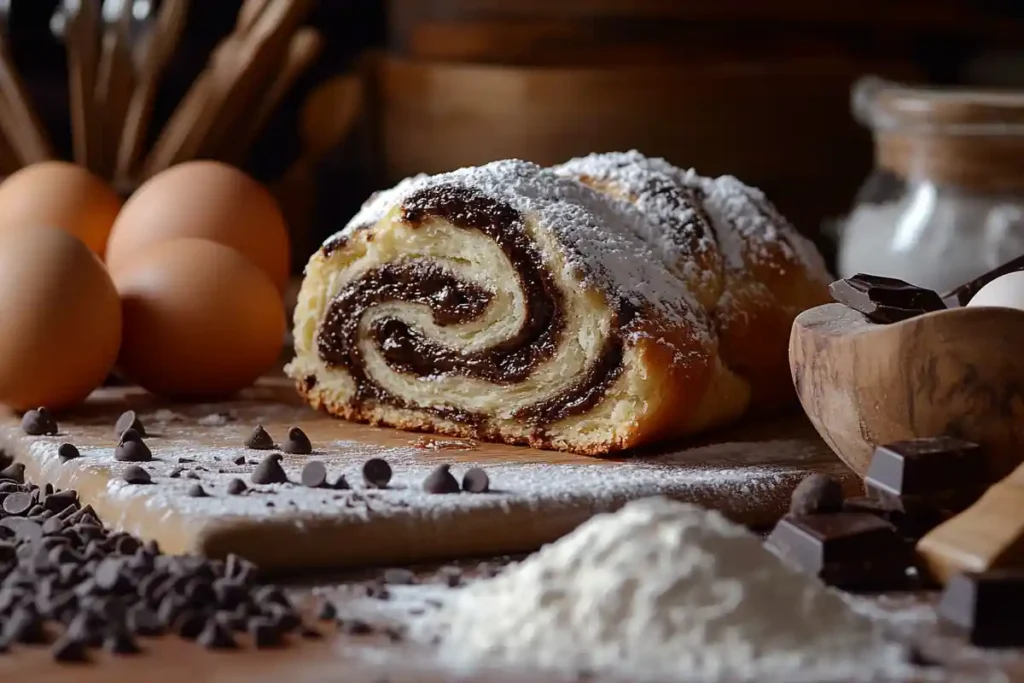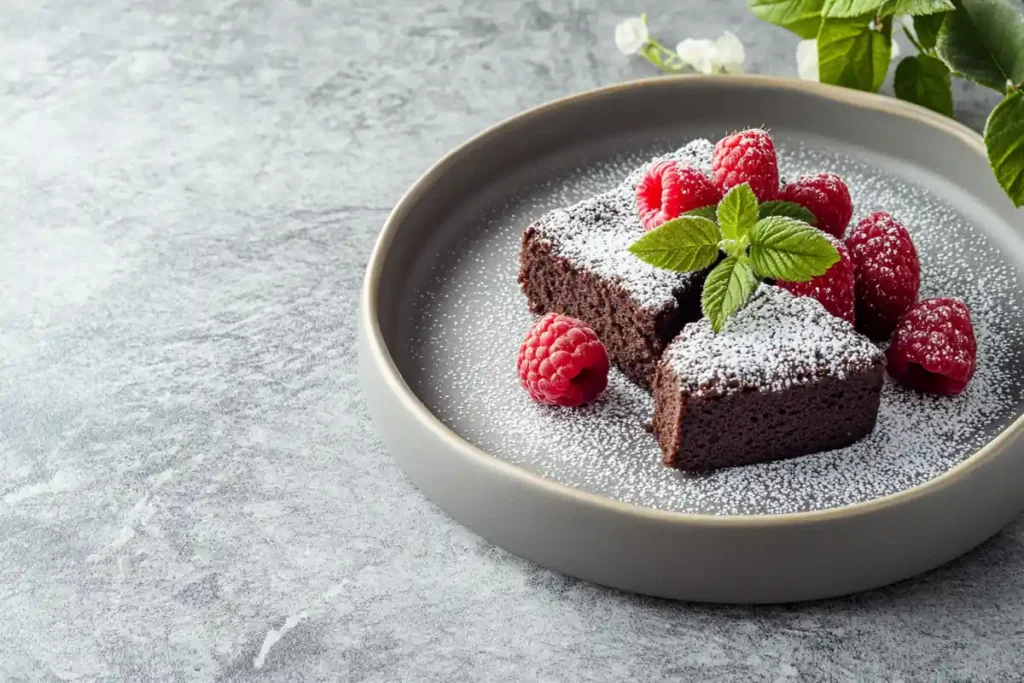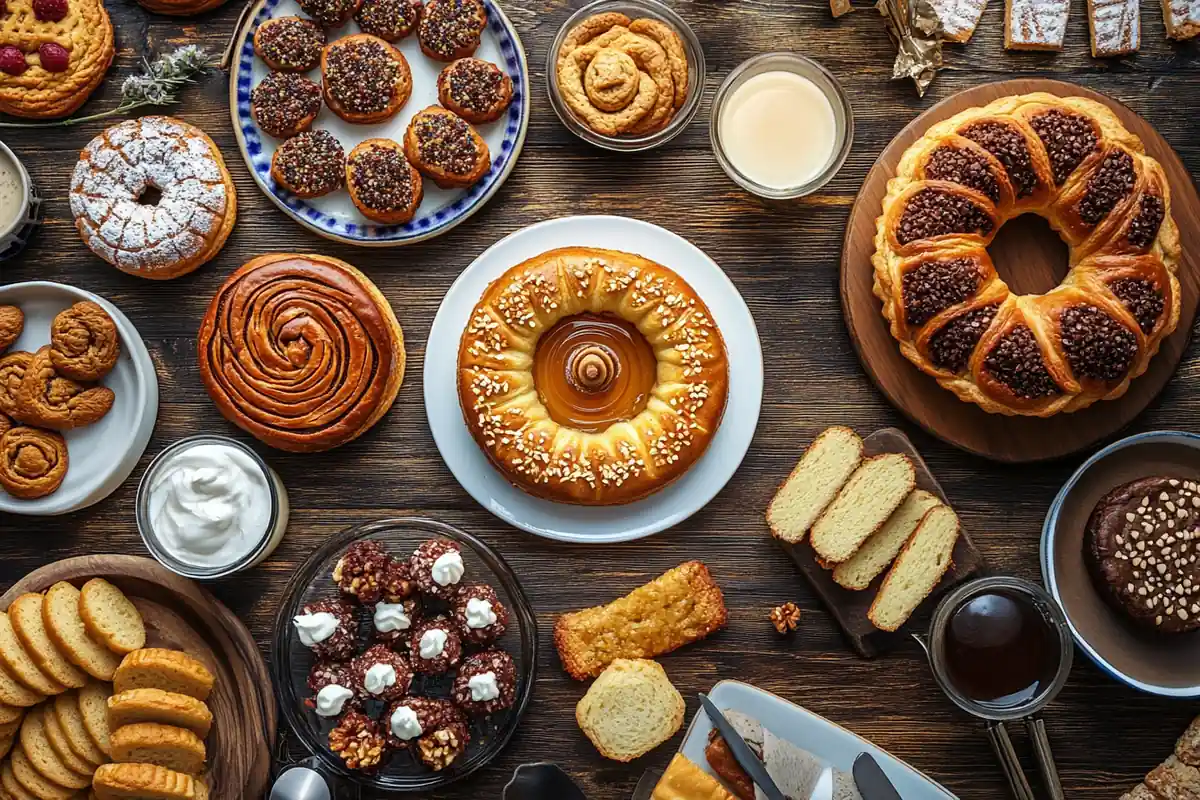Indulging in kosher dessert recipes opens up a world of sweet possibilities that adhere to Jewish dietary laws while pleasing every palate. From classic pastries like babka to modern creations like vegan brownies, kosher desserts showcase a blend of tradition, flavor, and innovation. In this article, we’ll guide you through an irresistible selection of desserts, tips for preparation, and adaptations for various dietary needs—all while ensuring you stay true to kosher guidelines. Let’s dive into the delightful world of kosher sweets!
Understanding Kosher Dessert Recipes
Understanding Kosher Dietary Laws
Kosher, meaning “fit” or “proper” in Hebrew, extends beyond a set of dietary rules—it’s a way of life for observant Jews. When it comes to desserts, the preparation and ingredients must meet specific standards. For instance, milk and meat cannot be combined in kosher meals, which means many desserts are parve—neutral in containing neither dairy nor meat. Moreover, the kitchen utensils and cookware used to make these sweets must also adhere to kosher standards.
Ingredients like gelatin, emulsifiers, and even some flavorings are checked for kosher certification. For those new to kosher cooking, reliable resources such as OU Kosher help identify acceptable products for your recipes. Whether you’re baking for a Sabbath meal or celebrating Hanukkah, understanding these rules ensures you’re always in compliance.
Significance of Desserts in Jewish Cuisine
Desserts play a pivotal role in Jewish cuisine, reflecting cultural diversity and historical richness. From Ashkenazi rugelach to Sephardic sfenj, every community has cherished sweet traditions. They are often served at religious and festive gatherings, embodying both symbolic meaning and culinary excellence. For example, honey cake, traditionally eaten during Rosh Hashanah, symbolizes hope for a sweet new year.
Many kosher dessert recipes also adapt well to dietary restrictions, making them inclusive for modern audiences. Imagine treating your guests to dairy-free cheesecake that’s as creamy and delicious as its classic counterpart or gluten-free rugelach that’s simply irresistible.
Overview of Kosher Dessert Categories
Kosher desserts fall into several delightful categories, showcasing versatility and innovation:
- Cakes and pastries: Classics like sponge cakes, chocolate babka, and honey cake dominate this category.
- Cookies and biscuits: From mandelbrot to black-and-white cookies, there’s something for everyone.
- Pies and tarts: Think apple strudel, pecan pie, or even citrus tarts.
- Frozen treats: These include refreshing sorbets and parve ice creams.
- Traditional Jewish sweets: Recipes like halva, kichel, and teiglach bring nostalgia and flavor to the table.
Popular Kosher Dessert Recipes
Classic Kosher Cakes and Pastries

When it comes to kosher dessert recipes, few things compare to the comforting allure of cakes and pastries. These baked goods are perfect for celebrations, holidays, or even a casual afternoon treat. Let’s explore some classics that are as rich in history as they are in flavor:
- Honey Cake (Lekach): Traditionally enjoyed during Rosh Hashanah, this moist, spiced cake embodies sweetness and warmth. Made with kosher-certified honey and a blend of spices like cinnamon and nutmeg, it’s a crowd-pleaser for any occasion.
- Babka: This braided yeast cake, swirled with chocolate or cinnamon, is as visually stunning as it is delicious. To ensure it’s kosher, verify that the chocolate spread or filling is certified.
- Rugelach: Bite-sized and flaky, these crescent-shaped pastries are filled with apricot, nuts, or chocolate. They’re the perfect blend of sweet and tangy, making them a delightful addition to any dessert platter.
- Sufganiyot (Jelly Donuts): A staple during Hanukkah, these deep-fried treats are filled with jam or custard and dusted with powdered sugar. Using kosher oil for frying keeps them in line with dietary laws.
Delicious Kosher Cookies and Biscuits
Cookies are a universal favorite, and kosher variations bring a unique twist to the table. Here are a few kosher cookie recipes to try:
- Mandelbrot: Often compared to biscotti, these twice-baked cookies are crunchy, nutty, and perfect for dipping in coffee or tea.
- Hamantaschen: Triangular-shaped cookies filled with poppy seeds, fruit jams, or even chocolate, traditionally enjoyed during Purim.
- Black and White Cookies: Soft, cakey, and topped with half-vanilla and half-chocolate icing, these iconic treats are both simple and sophisticated.
- Macaroons: Made with shredded coconut and often dipped in chocolate, these gluten-free cookies are a Passover favorite.
Scrumptious Kosher Pies and Tarts
Pies and tarts add a layer of elegance to kosher dessert recipes, offering endless possibilities for creativity:
- Apple Strudel: A flaky pastry filled with spiced apples, raisins, and cinnamon, this dessert pairs beautifully with a scoop of parve ice cream.
- Pecan Pie: A rich, nutty pie with a gooey filling, often sweetened with kosher maple syrup or honey.
- Chocolate Tart: Decadent and smooth, a chocolate tart made with a kosher-certified crust and parve chocolate is a surefire hit.
- Lemon Meringue Pie: A tangy citrus filling topped with fluffy meringue makes this pie a refreshing yet indulgent option.
Refreshing Kosher Frozen Desserts

Frozen desserts offer a light and refreshing end to a meal, especially during warm seasons:
- Sorbet: Made with fresh fruits like raspberry, mango, or lemon, sorbets are naturally dairy-free and perfect for kosher diets.
- Parve Ice Cream: Using non-dairy bases like coconut or almond milk, parve ice creams are creamy and versatile.
- Frozen Chocolate-Dipped Bananas: A fun and easy-to-make dessert, simply coat bananas in kosher parve chocolate and freeze for a cool treat.
- Granita: This semi-frozen dessert, made with fruit juice or coffee, is light, refreshing, and effortless to prepare.
Traditional Jewish Sweets
Dive into tradition with these time-honored kosher sweets that have been passed down through generations:
- Teiglach: Small dough balls boiled in honey syrup and stacked into a pyramid, this dessert is a sticky and sweet delight.
- Kichel: Often served at weddings or bar mitzvahs, these crisp, sugar-dusted cookies are light and airy.
- Halva: Made from sesame paste and sweetened with sugar or honey, halva is a rich and crumbly dessert enjoyed across Jewish communities.
- Sfenj (Moroccan Doughnuts): These fried doughnuts, often sprinkled with sugar, are a Sephardic favorite.
Adapting Recipes for Dietary Restrictions
Gluten-Free Kosher Desserts

For those avoiding gluten, kosher dessert recipes can easily be tailored to accommodate dietary needs without compromising on flavor. Gluten-free options are diverse and delicious, offering indulgence for everyone:
- Flourless Chocolate Cake: This rich and decadent cake uses eggs and kosher-certified dark chocolate to achieve a velvety texture. It’s naturally gluten-free and perfect for special occasions.
- Almond Cookies: Made with almond flour, these cookies are nutty, crisp, and irresistibly sweet. Ensure that the almond flour is labeled kosher to stay within guidelines.
- Coconut Macaroons: These chewy delights, made with shredded coconut and egg whites, are a staple for Passover and a favorite for those avoiding gluten.
Vegan Kosher Desserts
Whether for health reasons or personal choice, vegan kosher desserts are both innovative and satisfying. By replacing dairy and eggs, you can create plant-based treats that still taste amazing:
- Vegan Brownies: These gooey, fudgy brownies use ingredients like flaxseed meal or applesauce as egg substitutes. Pair them with kosher-certified non-dairy chocolate for an extra indulgent flavor.
- Dairy-Free Cheesecake: Using cashews or tofu as the base, dairy-free cheesecake mimics the creamy texture of traditional recipes. Add a parve graham cracker crust for a completely kosher delight.
- Eggless Challah Bread Pudding: Leftover challah bread gets a makeover with almond milk, sugar, and cinnamon, resulting in a comforting, dairy-free dessert.
Sugar-Free Kosher Desserts
Reducing sugar doesn’t mean skimping on flavor. These sugar-free desserts are ideal for those managing their sugar intake while still craving something sweet:
- Stevia-Sweetened Lemon Bars: Bright and zesty, these bars use stevia as a sugar substitute, ensuring the tangy flavor remains the star.
- Date-Sweetened Energy Bites: These no-bake treats combine dates, nuts, and cocoa powder for a naturally sweet, nutrient-packed dessert.
- Sugar-Free Apple Pie: Sweetened with natural fruit juices or stevia, this pie is every bit as comforting as its traditional counterpart.
Balancing Dietary Needs with Kosher Laws
Adapting recipes for dietary restrictions doesn’t just involve substituting ingredients—it also requires ensuring that all replacements adhere to kosher laws. For example, vegan options need to avoid non-kosher-certified plant-based products, while gluten-free recipes must use kosher-certified flours.
Keeping these principles in mind allows everyone to enjoy kosher desserts tailored to their dietary needs. These adaptations ensure that dessert remains a highlight of any kosher meal, regardless of restrictions.
Tips for Baking Kosher Desserts
Ensuring Kosher Ingredients
Baking kosher desserts starts with selecting the right ingredients. Not only do they need to meet general dietary standards, but they must also adhere to kosher guidelines:
- Check for Certification: Ingredients like flour, sugar, and baking powder may seem universally acceptable, but only those bearing a kosher certification ensure compliance.
- Dairy Substitutions for Parve Desserts: For parve desserts, opt for non-dairy alternatives like almond milk, coconut cream, or margarine. These maintain texture and flavor while staying kosher.
- Kosher for Passover Ingredients: During Passover, leavened products are avoided. Use alternatives like matzo meal or potato starch for baking.
By carefully checking labels and sourcing from trusted suppliers, you can confidently create desserts that are both delicious and compliant with kosher rules.
Maintaining a Kosher Kitchen
A kosher kitchen is essential for creating authentic kosher dessert recipes. Here are some must-follow tips to keep your kitchen kosher:
- Separate Utensils for Dairy and Meat: Use distinct mixing bowls, spoons, and baking pans for dairy and meat-based dishes to avoid cross-contamination.
- Cleaning Protocols: Clean all utensils and surfaces thoroughly after use, especially when switching between meat and dairy preparations.
- Dedicated Appliances: For those who frequently bake kosher desserts, consider separate appliances like stand mixers and ovens for parve or dairy items.
Consistency in maintaining a kosher kitchen ensures the integrity of your recipes and builds trust among guests with dietary concerns.
Baking Techniques for Perfect Desserts
Mastering kosher desserts is as much about technique as it is about ingredients. Follow these tips to ensure your baked goods turn out perfectly every time:
- Achieving the Right Texture: Use accurate measurements and avoid overmixing, especially with recipes like sponge cakes that rely on airy batters for a light texture.
- Proper Mixing Methods: Incorporate dry and wet ingredients in stages to prevent clumping and ensure even distribution. For recipes requiring whipped egg whites, fold gently to retain volume.
- Baking Times and Temperatures: Follow the recipe’s guidelines carefully and always preheat your oven. Use a kitchen thermometer for precise results, as slight temperature differences can affect outcomes.
Practical Tips for Beginners
For those new to baking kosher, start with simple recipes like cookies or muffins. These allow you to familiarize yourself with kosher-certified ingredients and kitchen practices without feeling overwhelmed.
Creating perfect kosher desserts takes practice, but with these tips, you’ll build confidence in no time. The next section focuses on answering common questions about kosher desserts to deepen your understanding of this delightful cuisine.
Frequently Asked Questions (FAQs)
What is a kosher cupcake?
A kosher cupcake is made with kosher-certified ingredients and adheres to Jewish dietary laws. It can be dairy or parve (dairy-free) to suit meal pairings.
What are kosher rules for dessert?
Kosher desserts must use certified ingredients, separate meat and dairy, and avoid leavened items during Passover.
What desserts are considered kosher?
Cakes, cookies, pies, and frozen treats can all be kosher if made with compliant ingredients and proper kitchen practices.
What are the 9 common desserts?
Popular options include chocolate cake, apple pie, sufganiyot, fruit sorbet, brownies, pecan pie, macaroons, and more—all adaptable to kosher standards.
Conclusion
Crafting delicious kosher dessert recipes is more than just a culinary exercise—it’s a celebration of tradition, adaptability, and flavor. From timeless classics like babka and honey cake to modern innovations like vegan brownies and gluten-free cookies, kosher desserts offer endless possibilities for every taste and occasion.
By understanding kosher guidelines, selecting certified ingredients, and maintaining a kosher kitchen, you can create sweet treats that honor Jewish dietary laws without compromising on creativity. Whether you’re baking for a festive holiday, a family meal, or a casual get-together, kosher desserts ensure everyone can enjoy a slice of sweetness.
Print
Classic Kosher Chocolate Chip Cookies
- Total Time: 25 minutes
- Yield: About 24 cookies 1x
Description
These chocolate chip cookies are a timeless treat! Made with simple ingredients and prepared with kosher guidelines in mind, they’re soft, chewy, and loaded with melty chocolate chips. Perfect for any occasion or Shabbat dessert, these cookies will leave everyone asking for more.
Ingredients
- 2 ¼ cups (280 g) all-purpose flour
- 1 teaspoon baking soda
- 1 teaspoon kosher salt
- 1 cup (225 g) unsalted margarine or butter, softened (ensure it’s kosher-certified)
- ¾ cup (150 g) granulated sugar
- ¾ cup (165 g) packed light brown sugar
- 1 teaspoon pure vanilla extract (kosher-certified)
- 2 large eggs
- 2 cups (340 g) kosher-certified semisweet chocolate chips
Instructions
- Preheat the oven:
Preheat your oven to 375°F (190°C) and line baking sheets with parchment paper or silicone baking mats. - Prepare the dry ingredients:
In a medium-sized bowl, whisk together the flour, baking soda, and kosher salt. Set aside. - Cream the butter and sugars:
In a large mixing bowl, beat the softened margarine or butter, granulated sugar, and brown sugar together until light and fluffy, about 2–3 minutes. - Add the wet ingredients:
Mix in the vanilla extract and eggs one at a time, beating well after each addition. - Combine dry and wet ingredients:
Gradually add the dry ingredients to the wet ingredients, mixing until just combined. Be careful not to overmix. - Fold in the chocolate chips:
Stir in the chocolate chips evenly using a spatula. - Portion the dough:
Scoop tablespoon-sized portions of dough and place them onto the prepared baking sheets, leaving about 2 inches of space between each cookie. - Bake:
Bake the cookies in the preheated oven for 8–10 minutes, or until the edges are lightly golden and the centers look slightly undercooked. - Cool:
Allow the cookies to cool on the baking sheets for 5 minutes before transferring them to a wire rack to cool completely.
Notes
- For a parve version, use parve margarine and kosher-certified parve chocolate chips.
- If you like thicker cookies, chill the dough for 30 minutes before baking.
- Store cookies in an airtight container at room temperature for up to 1 week.
- Prep Time: 15 minutes
- Cook Time: 10 minutes
- Category: Dessert
- Method: Baking
- Cuisine: Kosher, American
Nutrition
- Serving Size: 1 cookie
- Calories: 150
- Sugar: 12 g
- Sodium: 80 mg
- Fat: 7 g
- Saturated Fat: 4 g
- Unsaturated Fat: 3 g
- Trans Fat: 0 g
- Carbohydrates: 20 g
- Fiber: 1 g
- Protein: 2 g
- Cholesterol: 15 mg
Keywords: Kosher chocolate chip cookies, kosher dessert recipe, classic cookies, Shabbat dessert, easy baking recipe

